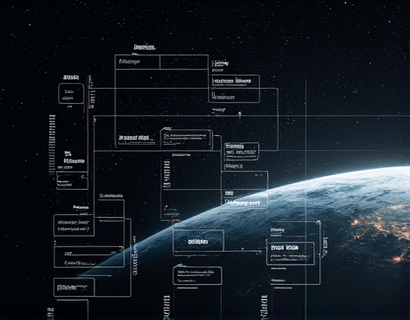Real-Time Government Data: Enhancing Civic Engagement and Transparency Through Open Access
The advent of real-time government data access represents a pivotal shift in the way democracies function, offering unprecedented opportunities for civic engagement and transparency. This transformation is rooted in the principles of open data, which advocate for the free and open availability of information held by the government. By making data accessible in real-time, governments can foster a more informed citizenry, enhance accountability, and promote collaborative governance. This article delves into the transformative impact of real-time data access on governance, highlighting how open data initiatives are revolutionizing the democratic process.
The Importance of Open Data in Governance
Open data is more than just a buzzword; it is a fundamental tool for modern governance. The core idea is simple: government data should be freely available to anyone to use and republish as they wish, without restrictions from copyright, patents, or other mechanisms of control. This openness is crucial because it empowers citizens, researchers, and developers to leverage data for various purposes, from improving public services to driving innovation.
The significance of open data in governance cannot be overstated. It serves as a cornerstone for building trust between the government and its citizens. When data is transparent and accessible, citizens can better understand how decisions are made, how public funds are spent, and how policies impact their lives. This transparency is essential for holding officials accountable and ensuring that government actions align with public interests.
Real-Time Data: A Game Changer for Civic Engagement
Real-time data takes open data to the next level by providing up-to-the-minute information on various government activities and services. This immediacy is transformative for civic engagement, as it allows citizens to stay informed and involved in the democratic process in real-time. For instance, real-time data on public transportation can help commuters plan their journeys more efficiently, while real-time crime data can inform community safety initiatives.
The impact of real-time data on civic engagement is multifaceted. Firstly, it enhances the timeliness of information, ensuring that citizens have the most current data at their fingertips. This is particularly important in areas such as public health, where real-time updates on disease outbreaks can save lives. Secondly, real-time data fosters a culture of continuous feedback, enabling citizens to respond quickly to government actions and policies. This dynamic interaction can lead to more responsive and adaptive governance.
Case Studies: Successful Implementation of Real-Time Government Data
Several cities and countries have successfully implemented real-time data initiatives, demonstrating the positive outcomes of such efforts. One notable example is New York City, which launched the NYC Open Data portal in 2025. This portal provides access to a wide range of datasets, including crime statistics, school performance, and environmental data. The portal has been instrumental in fostering a data-driven approach to urban planning and policy-making, with numerous civic projects and applications developed based on the data available.
Another example is the city of Barcelona, which has embraced open data as a key strategy for smart city development. The Barcelona Open Data platform offers a vast array of datasets, from traffic flow to energy consumption. These data resources have been leveraged by local organizations and citizens to create innovative solutions, such as apps that help residents report potholes or monitor air quality in real-time. The city's commitment to transparency and data sharing has not only improved service delivery but also strengthened citizen participation in governance.
Enhancing Accountability Through Real-Time Data
One of the most significant benefits of real-time government data is its role in enhancing accountability. When government operations are transparent and data is available in real-time, it becomes easier for citizens to monitor and evaluate the performance of public officials. This transparency can deter corruption and inefficiency, as officials are more likely to act in the public interest when they know their actions are being closely watched.
Real-time data can also facilitate proactive accountability measures. For example, real-time budget tracking allows citizens to monitor how public funds are allocated and spent, ensuring that resources are used effectively and transparently. This level of oversight can lead to more responsible fiscal management and greater public trust in government institutions.
Challenges and Considerations in Implementing Real-Time Data
While the benefits of real-time government data are clear, the implementation of such systems is not without challenges. One of the primary concerns is data quality and accuracy. Real-time data must be reliable and consistent to be useful. Governments need to invest in robust data management systems to ensure that the information provided is accurate and up-to-date.
Another challenge is the technical infrastructure required to support real-time data dissemination. This includes developing scalable platforms that can handle large volumes of data and ensuring that the data is accessible to a wide range of users, including those with limited technical expertise. Governments must also consider privacy and security issues, ensuring that sensitive information is protected while still maintaining transparency.
Fostering a Culture of Open Data
To fully realize the potential of real-time government data, a cultural shift is necessary. Governments must embrace a mindset of openness and collaboration, recognizing that sharing data is not just a legal requirement but a strategic advantage. This involves training government employees to think data-driven and fostering a culture where transparency and citizen engagement are valued.
Public awareness and education also play a crucial role. Citizens need to be informed about the benefits of open data and how they can utilize real-time information to participate more actively in governance. Educational campaigns and community workshops can help bridge the knowledge gap and encourage more people to engage with government data.
Conclusion: Towards a More Transparent and Collaborative Government
The integration of real-time government data into the fabric of democratic processes represents a significant step forward in enhancing civic engagement and transparency. By making data openly accessible, governments can build stronger, more informed communities and foster a culture of accountability and collaboration. The success of real-time data initiatives depends on a commitment to data quality, technical infrastructure, and cultural change. As more governments adopt these practices, we can look forward to a future where governance is more responsive, transparent, and inclusive.










































